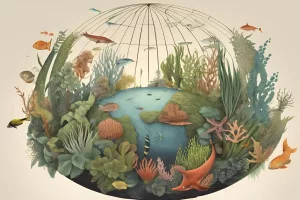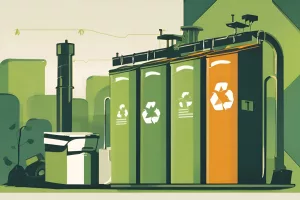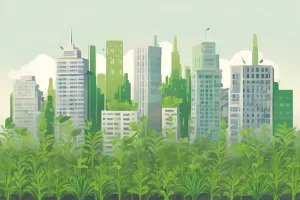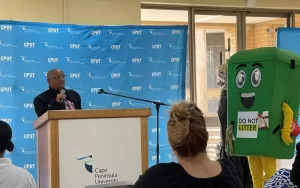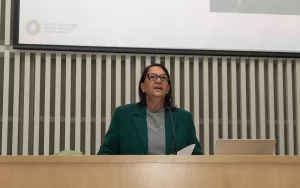Cape Town’s Vision 2050 paints a bright future where the city grows strong, fair, and ready for change. The plan focuses on building more homes, improving public transport, and keeping people safe with smart technology. It also aims to protect nature by using clean energy and saving water, while making sure everyone can join in decisions about the city’s future. Together, Cape Town’s people will create a lively, caring city where opportunity and hope bloom for all.
Alexkor is a key player in South Africa’s diamond mining scene, founded in 1992. It digs for diamonds along the beautiful northern coast and works hard to protect the environment and help local communities. Alexkor is not just about mining; it also focuses on planning and caring for the land, ensuring that its actions benefit everyone. As it prepares for an important meeting with government leaders, the company aims to show how it can grow while keeping nature and communities in mind.
Deputy Minister Narend Singh: Leading the Charge on Environmental and Economic Sustainability in South Africa
Deputy Minister Narend Singh is at the forefront of South Africa’s journey towards being more environmentally friendly and economically smart. He believes it’s essential to grow industries while taking care of nature, supporting laws that aim to reduce pollution and promote clean energy. At a recent gathering in Johannesburg, Singh highlighted the country’s promise to cut greenhouse gas emissions and create new green jobs, all while ensuring fairness for communities that depend on traditional industries. His message is clear: working together and embracing new ideas will help South Africa lead the way in building a brighter and more sustainable future for everyone.
Fuel prices in South Africa have recently dropped, bringing some muchneeded relief to shoppers and businesses. Over five months, prices fell by about R4, with petrol and diesel seeing reductions between R1.06 and R1.14 per liter. This decrease means lower transportation costs, which could help reduce the prices of everyday items. However, challenges remain, especially for the taxi industry, which struggles to stay profitable without government support. As we celebrate this decline, it’s also a reminder to think about our future and how we can use energy more sustainably.
Global cooperation for environmental sustainability is all about countries working together to tackle big problems like climate change, pollution, and the loss of plants and animals. Recently, leaders gathered in Rio de Janeiro to discuss how to help those who need support, especially developing countries. They talked about protecting oceans, reducing waste through recycling, and finding new ways to finance these efforts. The message was clear: if we combine our resources and ideas, we can create a healthier planet for everyone now and in the future. Together, we can make a difference!
Air France is bringing back its seasonal flights from Cape Town to Paris starting October 7th, flying three times a week. This exciting news comes just in time for the busy holiday season, with an extra flight added in November due to high demand. These flights will connect the stunning landscapes of Cape Town with the artistic charm of Paris, making travel easier for both tourists and business travelers. Using the advanced Boeing Dreamliner 787900, Air France is committed to providing a comfortable journey while being mindful of the environment. This renewal of service strengthens the bond between South Africa and France, opening up a world of adventure and connection for travelers.
The Pezula Championship Course in Knysna, South Africa, is a stunning gem along the beautiful Garden Route. This 18hole course not only challenges golfers of all levels but also showcases breathtaking views of the ocean and lush landscapes. With a focus on sustainability, Pezula blends seamlessly into its natural surroundings, making it a place where nature and sport come together beautifully. The luxurious clubhouse, complete with great dining and views, adds to the overall experience, ensuring every visit feels special. Whether you’re an expert or a beginner, Pezula promises a memorable day on the greens!
Arbor Month in Cape Town is a joyful celebration of trees and the environment, where the community comes together to plant beautiful indigenous trees like the Wild Olive. On September 25, 2024, city leaders planted two Wild Olives at the Bellville Municipal building, showing their commitment to a greener, healthier city. This event not only beautified the area but also strengthened community bonds and reminded everyone of the importance of caring for nature. With every tree planted, Cape Town invests in a brighter, more sustainable future for generations to come.
The African Circular Economy Alliance (ACEA) is leading the way in promoting a shift towards a circular economy in Africa, which challenges the traditional ‘take, make, dispose’ approach and focuses on principles of recycle and regenerate. The potential impact of this shift includes job growth, strengthened economies, and environmental benefits. At a recent Ministerial Briefing Dinner in Abidjan, Dr. Dion George, Minister of Forestry, Fisheries & Environment of South Africa, emphasized the urgent need for change towards a circular economy to address environmental challenges and socioeconomic issues facing the continent.
Unleashing the Power of Community Cleaning: Cape Town’s #SpringCleanCT Drive for 2024
Cape Town’s SpringCleanCT Drive is an annual campaign that urges citizens to take responsibility for maintaining the cleanliness of their city. The campaign includes a tollfree hotline to report illegal dumping, incentives for information leading to arrests, and a focus on the antilitter mascot Bingo. Mayor HillLewis issued a rallying call to the public to get involved in keeping the city sparkling clean and preserving the environment for the upcoming tourist season. The drive embodies community spirit, environmental guardianship, and a commitment to sustainability.
Cape Town is leading the way in sustainable waste management with its Material Recovery Facility. Equipped with advanced technology, the facility can recycle up to 65 tonnes of material per day and create over 100 new jobs. The city is also focusing on community education to empower citizens to engage in waste reduction and environmental conservation. This initiative showcases Cape Town’s commitment to a cleaner, greener, and more sustainable future.
Cape Town has won the national title for the World Wildlife Fund One Planet City Challenge (OPCC) twice, showcasing its commitment to sustainable urban development and renewable energy. The OPCC challenges cities globally to set climate goals aligned with the Paris Agreement’s objective of limiting global temperature increase to 1.5 °C. Cape Town’s strategies include condensed urbanization, transport electrification, and a balanced integration of adaptive actions, mitigation initiatives, and the United Nations’ Sustainable Development Goals, setting a worldwide exemplar for a future where urbanization coexists with sustainability. This triumph serves as a beacon of hope for cities across the globe.
Canal Walk Shopping Centre in Cape Town, South Africa is committed to environmental sustainability and has won the 5star Green Star Existing Building Performance Award for their efforts. They have decreased energy consumption by 34%, use water 44% more efficiently than the industry standard, and have implemented sustainable waste management methods. Their commitment to sustainability is evident in their daily operations, making them a leader in the retail industry’s adoption of green practices. They serve as an example for other retail entities to follow.
Cape Town’s V&A Waterfront has launched a sustainability initiative called ‘Our Better Nature’. The initiative aims to promote mindful consumption and encourage sustainable consumer practices to reduce landfill reliance. Its centerpiece is an installation featuring a gigantic suspended shopping trolley adorned with vibrantly colored bags made from repurposed waste materials. The initiative calls on the community to join in transforming waste into captivating artwork and to make even small acts of kindness for the environment.
Cape Town’s Trailblazing Approach to Waste Management: A Commitment to Sustainability
Cape Town’s Waste Education Week, a joint effort by CPUT and GTP, aims to create a culture of treating waste as material to be sorted, recycled, and reduced. CPUT has introduced a threebin separation system across all its campuses to become Cape Town’s first zerowaste university. The initiative serves as a model for sustainable living, emphasizing the significance of partnership and collaboration in achieving sustainability goals. The effects of this initiative are anticipated to reach far beyond the boundaries of the CPUT campus, marking a substantial stride towards environmental stewardship.
Cape Town recently held the Energy Water Waste Forum, which brought together city authorities and industry experts to find solutions to energy challenges while balancing economic expansion. The city has set ambitious goals to become carbonneutral and climateresilient by 2050, with a focus on enhancing energy efficiency. The forum was a strategic collaboration and marks a significant step towards a more sustainable and economically prosperous future for Cape Town.





